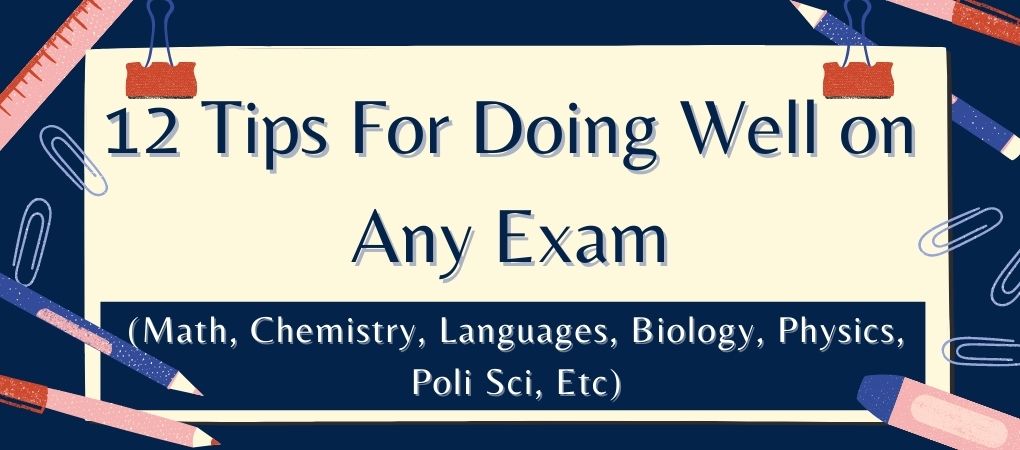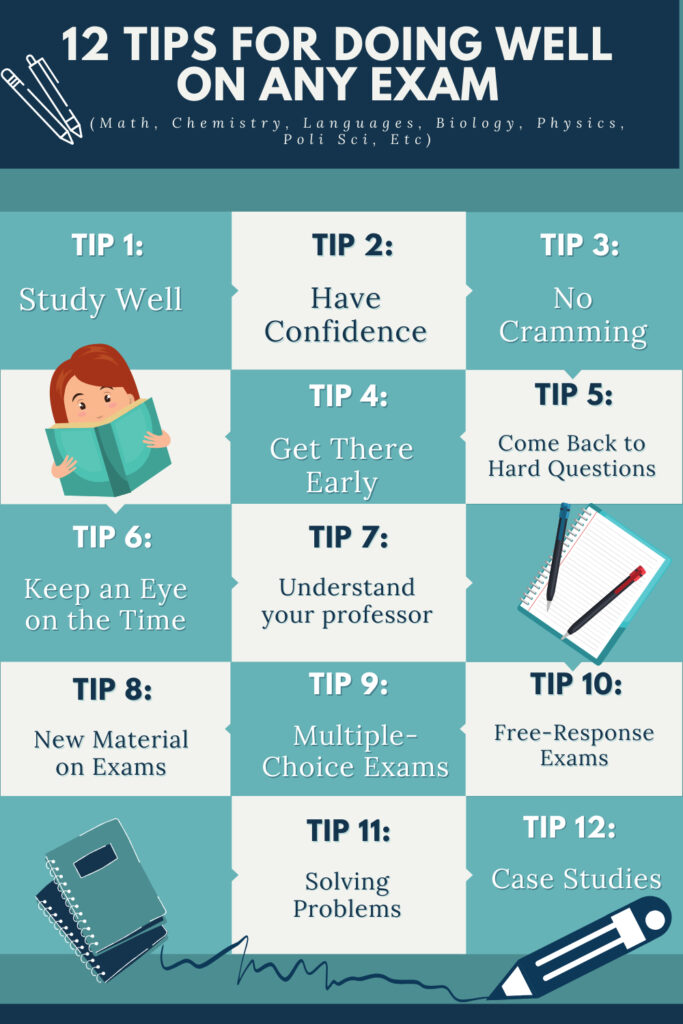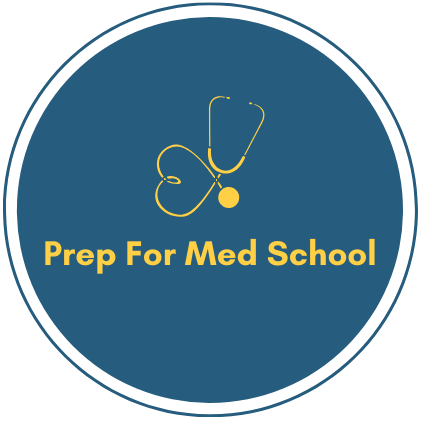12 Tips For Doing Well on Any Exam (Math, Chemistry, Languages, Biology, Physics, Poli Sci, Etc)

Exams are a big part of many undergraduates’ lives. For premeds especially, many courses will use exams as the primary method of assessing your understanding. This means that many of your grades will be based mainly on how you do on exams.
Unfortunately, not everyone does well on exams, even when they understand the material. Students struggle with test anxiety, time constraints, trick questions, and other obstacles to demonstrating their knowledge.
For the time being, however, exams are still the primary testing method for many college courses. Figuring out ways to help you succeed on exams will pay off time and again as you face the plethora of exams required for pre-meds, medical students, and doctors.
I know I am incredibly fortunate in that I have always been a good test-taker. It is the best way to show what I know, and I usually only get nervous for important exams, such as the MCAT.
Through some reflection, I have tried to identify tips for doing well on exams that helped me achieve a 4.0 in college and a 99th percentile on the MCAT. While every tip might not be applicable or helpful, I hope that everyone can find something useful in this article.
Tip 1: Study Well
The focus of this article is on exam-day itself, more so than the prep. However, properly studying is a huge part of succeeding on an exam, so I will address it briefly.
The best way to study is to study actively. Engage your brain in as many different ways as you can. Use flashcards, draw out processes, make concept maps, attempt practice problems, and do anything that requires active engagement.
Also, make sure to study in the best way for each course. I like to prep for an exam in the most similar way to how the questions will be structured. This might mean concept maps for free-response exams, flashcards for multiple-choice, or homework questions for problem-based exams.
However it works for you, make sure you know the material. Overcoming any of the other barriers will not lead to success unless you know the content.
Tip 2: Have Confidence
I know that this is way easier said than done, but you will not do well on an exam if you do not believe that you are capable of doing so.
Reflect on any past successes that you have had. Remember that you are a competent student who has achieved more than many people by making it this far. Keep in mind all the studying you have done and all the knowledge you have from that.
If you still doubt yourself, fake it till you make it. False confidence is better than no confidence at all. Tell yourself, ideally out-loud, that you will do well on this exam, that you are smart and capable, and that your hard work from studying will pay off. Repeat these things to yourself, and hopefully, over time, you will start to believe them.
Tip 3: No Cramming
As tempting as it can be, cramming is not the way to conquer an exam. Get your studying done in the days leading up to the exam, and try not to stay up too much later than usual the night before the exam. Sleep has many benefits, and ideally, you would get more sleep than normal before exam day.
Additionally, learning the material over time rather than all at once will help you in the long run. Spaced repetition better promotes learning, and you will remember the material for longer.
While sometimes school can become all about the grades, remember that you are there to learn. Learning the material effectively the first time will serve you better in the long run. Often final exams are cumulative, and thoroughly learning the material initially will prevent you from relearning everything for the final or even for the MCAT.
Tip 4: Get There Early
To avoid unnecessary stress before an exam, make sure to give yourself plenty of time to get to the exam room. Often exams are held in different places than your classes, so make sure you know where you are going and how long it takes to get there.
I would often prefer to be on campus doing some light reviewing before an exam if the exam were in the afternoon or evening. Getting together with some peers and going over the material is a great way to review key concepts and hopefully gain a little confidence in yourself.
Once you get to your exam room, ideally around 15 minutes before it starts, take your time getting settled. I always tried to sit close to the aisle so I wouldn’t have to step over anyone if I finished early.
Get out all of your materials. You can use this time to review some notes if you want, but try not to do so much reviewing that you stress yourself out about what you don’t remember.
Tip 5: Come Back to Hard Questions
On many exams, timing is vital. The last thing you want is to spend 20 minutes on a question that you might not even end up getting correct, and you then run out of time to complete questions that you would have known the answers to.
I usually go through the exam in order. If I reach a hard question, I spend a little time on it and maybe get my best guess down, but then I move on. I flag questions that I want to be sure to come back to if I have time. I circle questions that I don’t know and put a question mark by the ones I am unsure of.
No matter what you do, make sure to put something down for every question. Whether it is multiple-choice or free-response, you never know when you might get a point or two for putting down your best guess.
Finally, if you have time to go back over your exam, make sure to do it. Review every question if you have enough time. Otherwise, just look at your flagged questions. It is important not to second-guess yourself, as your first instinct is often right. However, keep an eye out for obvious mistakes that could cost you points.
Tip 6: Keep an Eye on the Time
Pacing is essential in exams. You want to have time to at least attempt every question. My strategy is to quickly establish a pace I want to keep before I begin answering questions.
I do this by doing rough math using the number of questions and the total time. This can be tricky when an exam is part multiple-choice, which tends to be quicker, and part free-response, which usually requires more time.
Just try to get an idea of where you want to be halfway through time. Keep an eye on the clock, and make note of if you reached this point or not. You then know if you need to speed up or if you can continue at your current pace.
Tip 7: Understand your professor
Often understanding your professor and the types of things they emphasize or look for helps on an exam. Unfortunately, this is easier said than done.
Often when taking exams, there are questions where you can tell what the professor wants you to answer just based on how they taught the material and what they emphasized.
A simple example of this is if there are two possible answers you are considering to a question. One option you only read about in the textbook, while the other was the subject of a case study you did in class. I would expect the answer to be the one covered in class.
If a professor ever says something like “this is my favorite equation” or “I love questions about this,” remember that. That is a good sign that those concepts might come up in a big way on the exam.
These tips are by no means rules, but they can be helpful. This also varies with the professor. Some might be the type to pull out information from the textbook, but most tend to test what they covered the most in class.
Tip 8: New Material on Exams
Most students get stressed out when they see terms or concepts on an exam that they did not study. However, the vast majority of professors will not put brand new material on an exam and expect you to know what is going on.
If you see something new, the professor does not expect you to know about it. The question contains all the information you need to know. Pull out whatever details relate to something you did learn and use that to solve the problem.
Don’t let seemingly new material trip you up. The professor is simply seeing if you can extrapolate what you have learned to a unique situation. Some professors are big fans of this method, so learning to do this well can help you succeed.
Tip 9: Multiple-Choice Exams
Multiple-choice is a widespread testing method, especially for intro-level courses. However, I think it is a common misconception that multiple-choice is easy. I can remember several times where the multiple-choice section was far more difficult than the free-response.
The nice thing about multiple-choice is that you know the correct answer is in front of you, and in theory, you have a 25% chance of guessing it correctly. However, the other answer choices are often misleading, and you still need to know the material very well to succeed. There is no partial credit in these questions. You either get it right or wrong.
When approaching a multiple-choice question, make sure to read the phrasing very clearly. Often words like ‘not’ or ‘least likely’ are included, so make sure you know what the question is actually asking.
Then make sure to look at all of the answer choices. It can be easy to see an option that looks correct, circle it, and move on without realizing that a more accurate answer was listed further down.
Look carefully at the wording of the answers and compare them to what you studied. Do your best to eliminate any answers that you can. If you at least narrow it down to two choices, then you now have a 50/50 chance of getting it right.
There are some small strategies I use in answering multiple-choice. For instance, if two of the options directly contradict each other, usually one is the correct answer. Be wary of absolutes, such as answers that say something always or never happens. These can certainly be the answer, but usually only when it was made very clear in lecture that this is the case.
Multiple-choice comes down to knowing the material well. If you study hard, it can become easy to pick out the right answers from the choices.
Tip 10: Free-Response Exams
Students often see free-response as being more difficult because you cannot just guess an answer. You need to come up with information all on your own. The benefit of free-response is that you can get partial credit if you remember some, but not all, of a concept.
Besides knowing the material to answer the questions, I have a few tips regarding free-response questions. What I am describing here applies best to conceptual free-response, usually in the form of words and sentences. This is common in biology, but all subjects use conceptual free-response.
For these questions, write whatever you can remember about the topic in the question. Even if you don’t know how to answer the question directly, you could pick up some points for demonstrating some level of understanding.
Sometimes there is a word or sentence limit, so you cannot just spew out everything you know, but instead must select the most relevant information to answer the question.
Some professors also grade your responses more strictly and look for the mention of key terms or phrases to get points, rather than just adequately describing the concepts. Look out for this, and if this is the case, include as many vocabulary words as you can.
Thoroughly answering free-response questions often involves having a deep understanding of the material. As with all problem types, the best way to succeed is to study effectively and to practice working through material and concepts in different ways.
Tip 11: Solving Problems
For math, physics, and often chemistry, exams contain a lot of problems. For me, I think of problems as being mainly number-based. You follow some set method learned in class to solve for whatever the question asks.
The rubric for grading problems often involves points for things like writing down the correct starting equation or having the correct units. This means that you should write at least something down, even if you don’t know how to solve the whole problem.
Remember that even if a problem is more complicated than what you did in class, you can often break it down into more manageable parts that you do know how to approach. Focus on what you are supposed to find and what information you need to solve for that. See if there is any way to get that information using the numbers in the question.
Make your best attempt at solving the problem. You never know what points you might pick up. Practicing homework and other textbook problems can help you learn how to approach what you see on the exam.
Tip 12: Case Studies
I consider case studies a subset of free response questions and even of math or method-based problems. What makes case studies unique is that they present a new situation and ask you to apply what you have learned.
Typically, case studies describe a situation and maybe include figures or diagrams. They then ask a series of questions that require you to extrapolate from the information provided. This is a great way for professors to check for a deeper understanding of the material.
The big thing with case studies is not to get overwhelmed by the new information presented. Often there are extraneous details that will not be relevant to the problems, yet the case study includes everything you need.
For each question, think about what information you would need to answer it if it came as a stand-alone homework question. Look through the case study for the details that you need.
It takes time to master case studies, and it is tricky because each one is different. Just stay calm and focus on the information you studied.
Conclusion
While a big part of succeeding on exams is knowing the material, there are many other barriers. There are ways to improve your exam-taking, whether by addressing test anxiety, finding strategies for approaching problems, or setting yourself up for success on exam day.
I hope that some of the tips in this article have been useful and will help you with exams in the future. It might take time and testing out different methods, but hopefully, you can find some strategies and habits that work for you to help you do your best on exams.
Remember that while exams are important, and succeeding on them is a big part of being a pre-med student, they are not everything. Try not to let it get you down if you struggle with exams or do not get the grades you were hoping for. Exams are one way of measuring your understanding of the material; they in no way measure your worth as a person.


Leave a Reply